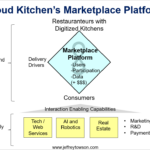Digital strategy consultant Jeffrey Towson reveals the 5 reasons why CloudKitchens’ platform plus AI business model is superior to Uber’s. By leveraging a more efficient and data-driven approach, CloudKitchens is able to optimize its operations and outperform Uber in the food delivery space. With its winning digital transformation strategy, CloudKitchens is poised to disrupt the industry and leave competitors behind.









